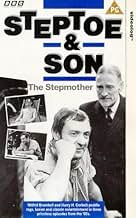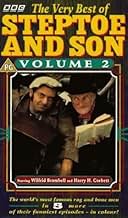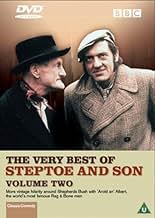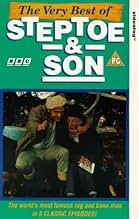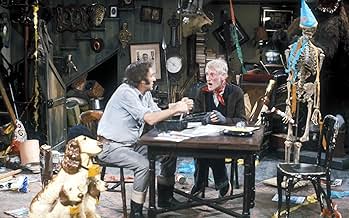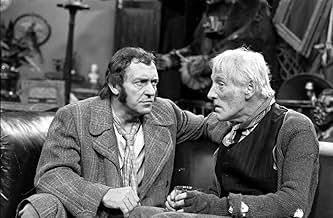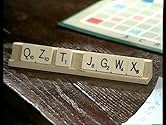VALUTAZIONE IMDb
7,8/10
3598
LA TUA VALUTAZIONE
Aggiungi una trama nella tua linguaBritish sitcom about a father-and-son rag-and-bone business in London. The intergenerational divide between the miserly Steptoe and his ambitious son results in comedy, drama, and tragedy.British sitcom about a father-and-son rag-and-bone business in London. The intergenerational divide between the miserly Steptoe and his ambitious son results in comedy, drama, and tragedy.British sitcom about a father-and-son rag-and-bone business in London. The intergenerational divide between the miserly Steptoe and his ambitious son results in comedy, drama, and tragedy.
- Premi
- 2 vittorie totali
Sfoglia gli episodi
Recensioni in evidenza
I am an American who has only discovered the marvelous 'Steptoe & Son' British television series many years after it originally aired. I have managed to watch just about every episode that is available on you tube. I highly recommend this television classic. There were numerous episodes that made me want to cry. The death of their horse Hercules was virtually unbearable, as well as the one where Harold had Albert placed in a old folks' home. The love-hate relationship of the father and son junk company team is more intense than anything ever seen on American television. Although I feel very sorry for Harry being trapped in a world he never made, I find Albert the more appealing of the two. I also can understand the old man's accent more than the son's.
Although Steptoe and Son ran on British TV for twelve years it is one of those rare (maybe unique) examples of an idea which continued to develop and evolve rather than slide into stale repetition.
In its early years the series emphasised broad comedy. One well-remembered episode features Albert eating a meal while sitting in his bath, earning a rebuke from his son which became a national catchphrase: "You dirty old man!"
As time went by the characters became established and the writing began to emphasise the mutual dependency of two basically lonely men (Harold the batchelor and Albert the widower). Harold dreams of a better quality of life away from his father and constantly makes attempts to achieve something in his own right. His attempts are thwarted by his own lack of social standing and his father's scheming: if Harold joins a local theatre group, Albert joins too and becomes the star of the show.
Albert, for his part, fears losing his son and being abandoned in his old age. He will use any means (especially moral blackmail) to keep Harold at his side. More importantly he is far more realistic than Harold and sees that his attempts at social ambition are doomed.
In one of the most moving episodes an old girlfriend of Harold's reappears after many years. They still feel the same way about each other and plan to marry. Finally Harold can break away from the old man. Naturally Albert has other ideas, but at the climax of the show it is the girl who ends the relationship, telling Harold he is already married.
The performances of Wilfrid Brambell and Harry H Corbett never faltered through the show's run. Galton and Simpson produced scripts of wit and insight and they performed with great skill and subtlety. This is a show where you laugh while recognising the truth and basic sadness of the situation in which the characters live.
In its early years the series emphasised broad comedy. One well-remembered episode features Albert eating a meal while sitting in his bath, earning a rebuke from his son which became a national catchphrase: "You dirty old man!"
As time went by the characters became established and the writing began to emphasise the mutual dependency of two basically lonely men (Harold the batchelor and Albert the widower). Harold dreams of a better quality of life away from his father and constantly makes attempts to achieve something in his own right. His attempts are thwarted by his own lack of social standing and his father's scheming: if Harold joins a local theatre group, Albert joins too and becomes the star of the show.
Albert, for his part, fears losing his son and being abandoned in his old age. He will use any means (especially moral blackmail) to keep Harold at his side. More importantly he is far more realistic than Harold and sees that his attempts at social ambition are doomed.
In one of the most moving episodes an old girlfriend of Harold's reappears after many years. They still feel the same way about each other and plan to marry. Finally Harold can break away from the old man. Naturally Albert has other ideas, but at the climax of the show it is the girl who ends the relationship, telling Harold he is already married.
The performances of Wilfrid Brambell and Harry H Corbett never faltered through the show's run. Galton and Simpson produced scripts of wit and insight and they performed with great skill and subtlety. This is a show where you laugh while recognising the truth and basic sadness of the situation in which the characters live.
This is a BBC sitcom that's set in Shepherd's Bush, West London. It's about a father and son who are rag-and-bone men. It ran from 1962-1974. There were also films, plays, documentaries and versions of the TV series made by other countries.
It's well-written and well-acted. There are many good performances from actors who only appear in one or two episodes each.
It's well-written and well-acted. There are many good performances from actors who only appear in one or two episodes each.
Along with Rab Nesbitt this is equally my top of British comedy. The worst episode holds more laughs than the best of anything else. The idea is so simple in real terms but holds so much span of internal conflict and emotional war. Father and son material, as most men know is like a battlefield of top dogism..Here we have a 40 year old man living with a father who has been widower for the same time with equal demons to come to terms with. If any man out there who had a father who could play football or cards better than him then this is for you. Apart from all this social comment the script was so funny and witty it can be often funny without empathy. Whatever funny you're after , this has it!
A brilliant exercise in British comedy from the sixties and seventies ! Not one episode fails to please and the dialogues were extremely savoury. A certain number of episodes are available on BBC dvds in the UK region 2. The picture quality of the latter episodes is so good that you'd swear they'd been made yesterday. It is hard to believe that both of these characters have sadly left us but thanks to this series they will live on forever in our hearts and minds ! It appears that in real life, Wilfred Brambell was an exceedingly well-spoken man and didn't have a common accent at all. In one of the episodes involving Harold acting in a play, we do in fact hear Albert speak in a very posh voice albeit very briefly.
Lo sapevi?
- QuizWilfrid Brambell was only 49 when he began playing Albert Steptoe, who was supposed to be 63 when the series began.
- BlooperThe physical positioning of the Steptoe's outside toilet varies over the course of the series: sometimes it is plumbed in facing the yard gates, at other times it's rotated to face the wall.
- Citazioni
[repeated line]
Harold Steptoe: You dirty old man!
- ConnessioniAlternate-language version of Stiefbeen en zoon (1963)
I più visti
Accedi per valutare e creare un elenco di titoli salvati per ottenere consigli personalizzati
Dettagli
- Data di uscita
- Paese di origine
- Lingua
- Celebre anche come
- Степто и сын
- Luoghi delle riprese
- Stable Way, Kensington, Londra, Inghilterra, Regno Unito(Junkyard exteriors)
- Azienda produttrice
- Vedi altri crediti dell’azienda su IMDbPro
- Tempo di esecuzione45 minuti
- Colore
- Mix di suoni
- Proporzioni
- 1.33 : 1
Contribuisci a questa pagina
Suggerisci una modifica o aggiungi i contenuti mancanti

